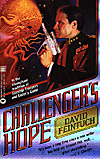 Published by Warner Books, 1995.
Published by Warner Books, 1995.
paperback, $5.50, ISBN: 0-446-60097-0
407 pages.
Challenger's Hope, the sequel to Midshipman's Hope, carries on the brilliant tradition of the Hope series. Like most sequels, you should read the first book to understand much of the motivations and character of the hero, Nicholas Seafort, who rose from midshipman to captain. And like most sequels, if you plunge right in, you'll be able to pick up the nuances of his character right away, although you'll be the poorer about his entire background.
Part of the appeal is the continued development of Seafort. Under Feintuch's decisive word processor, Seafort transforms under the responsibility thrust upon him, yet still returns to the basic rigidity, sense of duty, and intolerance of regulation violations that makes him who he is, or, at least contributes to what he has become. The writing style remains simple and clean--an extremely fast read that, like the first book and the next two after Challenger's Hope, keeps you reading way past bed time.
It is 2197, and Seafort is back in command of a ship that is part of a flotilla sent to reinforce the colonies and watch for "fish," the nickname given to a race of hostile aliens who float in the depths of space. Although the aliens were first found in Midshipman's Hope, the battle between humans and fish becomes more desperate in this sequel, as a cowardly admiral maroons Seafort with a crippled ship full of ghetto kids derogatorily called, "trannies," a ragtag lot of civilians, and a crew one step away from mutiny. And that's only the start of his problems.
Credit Feintuch with continued excellence in setting up the narrative, then taking you along for the ride without knowing where it's going. Challenger's Hope provides as many thrills, chills, and battle of wills as Feintuch's first book in the series.
Note: There are technically five books in the Hope series: Midshipman's Hope, Challenger's Hope, Prisoner's Hope, Fisherman's Hope, and Voices of Hope, but the last should not be considered part of the series, as it takes place almost entirely upon Earth with minimal involvement with the Navy.
Related Reviews:
Back to List of Book Reviews: Military Science Fiction
© Copyright 1996 by Coalition Web, Inc.
This article appears in MagWeb (Magazine Web) on the Internet World Wide Web.
Other military history articles and gaming articles are available at http://www.magweb.com